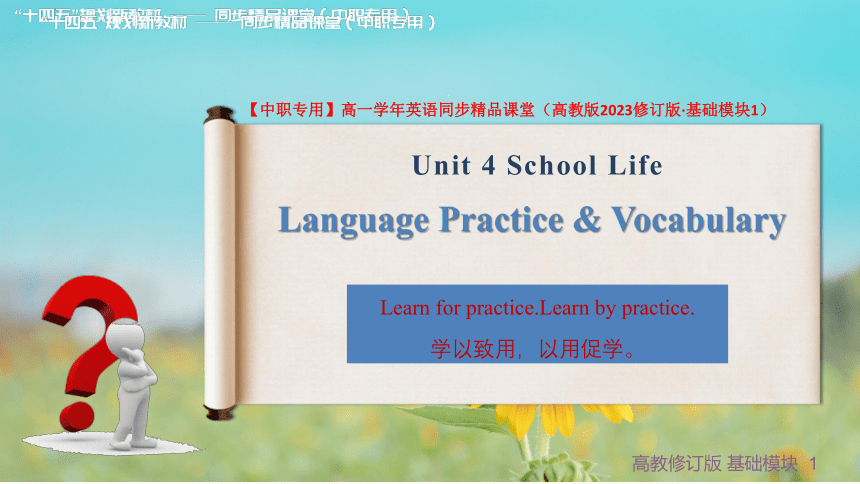(
课件网) Unit 4 School Life Language Practice & Vocabulary Learn for practice.Learn by practice. 学以致用,以用促学。 高教修订版 基础模块 1 Learning objectives knowledge objectives ability objectives emotional objectives Master the basic usage of general future tense. Develop good study habits, improve pragmatic ability. Understand the differences in thinking between the East and the West reflected in language expression 一般将来时 Vocabulary 1. 2. Content 3. 4. Homework Warming up Learn for practice.Learn by practice. 学以致用,以用促学。 Warming up Part 1 Warming up 比较句子,注意动词 You will learn and practice your skills in the training center. When will the competition begin What are you going to do after that I am going to watch it. Shall we go together The singing club is holding a competition this afternoon. You will learn and practice your skills in the training center.When will the competition begin What are you going to do after that I am going to watch it. Shall we go together The singing club is holding a competition this afternoon. Read the sentences,pay attention to the Words in italics 时态是一种动词形式,用以表示不同的时间与方式。主要分为以下几大类: 一、一般现在时:主语 + 动词原形(当主语为第三人称单数时,动词要变为相应的第三人称单数形式)。 二、一般过去时:主语 + 动词的过去式。 三、一般将来时:will/shall + 动词原形。 be going to + 动词原形。 四、现在进行时:主语 + be 动词 + 现在分词。 五、过去进行时:主语 + was/were + 现在分词。 六、将来进行时:主语 + will be + 现在分词。 七、现在完成时:主语 + have/has + 过去分词。 八、过去完成时:主语 + had + 过去分词。 时态:时间和动词的状态 一般将来时 Part 2 1. We are going to have a picnic tomorrow. (明天) 明天我们要野餐。 2. He is going to Shanghai the day after tomorrow. (后天) 后天他将去上海。 3. You will see your students soon. (很快 不久) 你将很快看到你的学生们。 4. They will get to Tianjin in three days. (三天后) 他们三天后将到达天津。 5. She will go to Dalian next week. (下周) 下周她将去大连。 观察比较 一般将来时 定义:表示将来某一时刻的动作或状态, 或将来某一段时间内经常的动作或状态。 I will go to Beijing next week. (我下周将去北京。) She is going to have a party tomorrow. (她明天将举办一个派对。) 一、构成方式 1.“will + 动词原形”,will 是一般将来时最常用的助动词,用于所有人称。 I will go to the park tomorrow.(我明天会去公园。) “will” 没有人称和数的变化。 否定形式为 “will not(won't)+ 动词原形”。 He won't be late for school.(他上学不会迟到。) 一般疑问句将 “will” 提到句首。 Will you come to my party (你会来我的聚会吗?) 一般将来时 2.“be going to + 动词原形” 表示计划、打算做某事,或者有迹象表明即将发生某事。 例如:She is going to study abroad next year.(她明年打算去国外学习。) 否定形式 “be not going to + 动词原形”。 例如:They aren't going to watch the movie tonight.(他们今晚不打算看电影。) 一般疑问句将 “be” 提到句首。 例如:Are you going to have a picnic this weekend (你这个周末打算去野餐吗?) 一 ... ...

